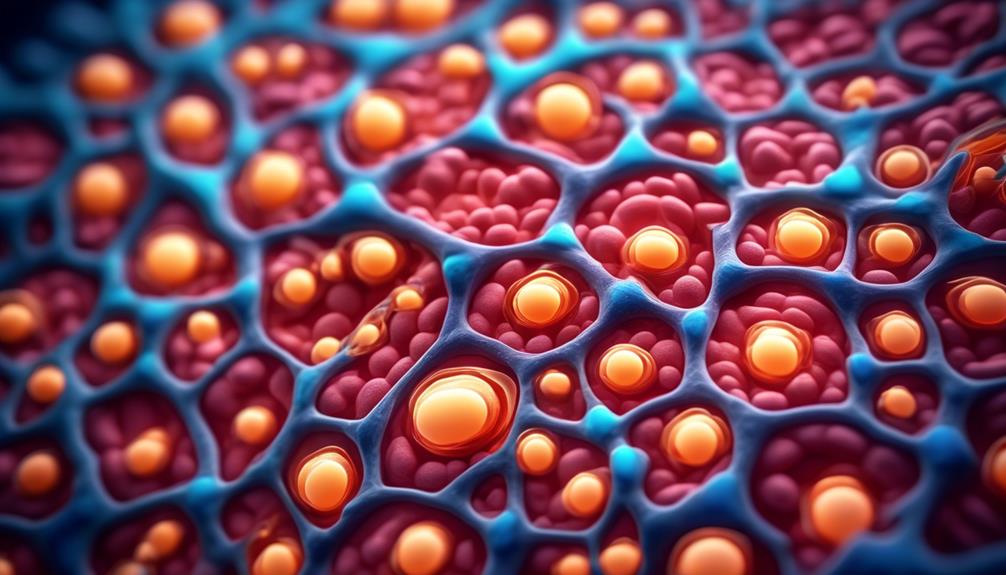You may be wondering why a keto diet, which is high in fat, can actually lower blood sugar levels. Well, contrary to popular belief, it's not just about cutting out carbohydrates. While reducing carbohydrate intake is indeed a key factor, there are several mechanisms at play that contribute to this effect.
In fact, a keto diet can improve insulin sensitivity, increase ketone production, and even lead to beneficial changes in the gut microbiome. But how exactly does all this happen?
Let's explore the fascinating science behind why a keto diet can have such a powerful impact on blood sugar.
Insulin Sensitivity Improvement

Improving insulin sensitivity is a key benefit of following a keto diet. Insulin sensitivity refers to how effectively your body uses insulin to regulate blood sugar levels. When insulin sensitivity is low, it can lead to insulin resistance, a condition where your body becomes less responsive to the hormone's actions. This can result in high blood sugar levels and an increased risk of developing type 2 diabetes.
Research suggests that a keto diet can help improve insulin sensitivity and reduce insulin resistance. By restricting carbohydrates and consuming a higher proportion of fats, the body enters a state of ketosis, where it primarily uses fat for fuel instead of glucose. This shift in metabolism can have several positive effects on blood sugar regulation and insulin sensitivity.
Firstly, the keto diet promotes weight loss, which is crucial for improving insulin sensitivity. Excess weight, especially around the abdominal area, is associated with insulin resistance. By reducing body fat, the keto diet can help enhance insulin sensitivity.
Secondly, the low-carbohydrate nature of the diet reduces the need for insulin release. With fewer carbohydrates being consumed, there's less demand for insulin to transport glucose into cells. This can help regulate blood sugar levels and reduce insulin resistance.
Reduced Carbohydrate Intake
When you reduce your carbohydrate intake, it can have a significant impact on your blood sugar levels. By consuming fewer carbs, your body produces less glucose, leading to lower blood sugar levels.
Additionally, this reduction in carbohydrates can improve insulin sensitivity, making your body more efficient at utilizing the insulin it produces.
Ultimately, by following a keto diet and reducing your carbohydrate intake, you can help regulate your blood sugar levels and improve your overall health.
Carb Restriction and Glucose
Reducing carbohydrate intake has been shown to have a positive impact on glucose levels. When you restrict carbs, your body undergoes several metabolic changes that contribute to better blood sugar control. Here are four ways in which carb restriction can benefit your glucose levels:
- Lower insulin levels: Carbohydrates are the main driver of insulin secretion. By cutting back on carbs, you reduce the demand for insulin, which helps lower blood sugar levels.
- Enhanced insulin sensitivity: Carb restriction can improve insulin sensitivity, allowing your cells to better respond to the hormone and take up glucose from the bloodstream more efficiently.
- Reduced glycogen stores: Carbohydrates are stored as glycogen in the liver and muscles. By limiting carb intake, you deplete these glycogen stores, leading to lower blood sugar levels.
- Increased fat burning: When you consume fewer carbs, your body switches to burning fat for fuel. This process, known as ketosis, can help regulate blood sugar levels by providing a more stable source of energy.
Insulin Sensitivity Improvement
By reducing your carbohydrate intake, you can positively impact your insulin sensitivity and enhance your body's ability to respond to the hormone. This improvement in insulin sensitivity is one of the key reasons why a keto diet can lead to improved metabolic health and weight loss benefits.
When you consume fewer carbohydrates, your body has less glucose to process, which means less insulin is needed to regulate blood sugar levels. As a result, your cells become more receptive to insulin, allowing glucose to enter them more efficiently.
This improved insulin sensitivity can help prevent insulin resistance, a condition where the body's cells become less responsive to insulin, leading to elevated blood sugar levels.
Ketones as an Energy Source
To optimize your body's energy source on a keto diet with reduced carbohydrate intake, ketones become the primary fuel for your cells. By limiting carbohydrate intake, your body is forced to break down fats into fatty acids and convert them into ketones through a process called ketogenesis. These ketones can then be used as an alternative fuel source to glucose, providing energy to your cells and tissues.
Here are four key points about ketones as a fuel source on a keto diet:
- Increased metabolic flexibility: By relying on ketones for energy, your body becomes more flexible in its ability to switch between using glucose and ketones as fuel. This metabolic flexibility allows for a more efficient use of energy and can improve overall performance.
- Sustained energy levels: Ketones provide a steady source of energy without the fluctuations associated with glucose metabolism. This can result in improved mental clarity, increased endurance, and reduced feelings of fatigue.
- Enhanced fat burning: The use of ketones as fuel promotes the breakdown and utilization of stored body fat, aiding in weight loss and body composition improvements.
- Reduced insulin levels: Ketones as a fuel source can lead to lower insulin levels, which is beneficial for individuals with insulin resistance or diabetes.
Increased Ketone Production
When you follow a keto diet, your reduced carbohydrate intake forces your body to enter a state called ketosis, where it starts producing ketones for energy instead of relying on glucose.
This increase in ketone production can have several benefits for blood sugar regulation.
Firstly, it helps improve insulin sensitivity, allowing your body to better utilize the insulin it produces.
Additionally, by decreasing your carbohydrate intake, the keto diet helps prevent blood sugar spikes and crashes, leading to more stable and controlled glucose levels.
Ketosis and Glucose Regulation
The increased production of ketones during ketosis plays a crucial role in regulating glucose levels in the body. When you follow a keto diet, your body enters a state of ketosis where it starts using ketones, derived from fat, as its primary source of energy instead of glucose. This shift in fuel source has several effects on glucose regulation:
- Insulin sensitivity: Ketones improve insulin sensitivity, reducing insulin resistance and allowing your cells to better utilize glucose.
- Reduced glucose production: Ketosis leads to decreased glucose production in the liver, helping to lower blood sugar levels.
- Increased glucose uptake: Ketones promote glucose uptake by your muscles, effectively lowering blood sugar levels.
- Glucagon suppression: Ketones also suppress the release of glucagon, a hormone that raises blood sugar, further contributing to glucose regulation.
Insulin Sensitivity Improvement
As ketosis is achieved through following a keto diet, the increased production of ketones serves to improve insulin sensitivity, allowing your cells to more effectively utilize glucose. This improvement in insulin sensitivity is crucial for reversing insulin resistance, a condition where the body's cells become less responsive to the effects of insulin.
Insulin resistance is a hallmark of type 2 diabetes and can lead to elevated blood sugar levels. By following a keto diet and entering into a state of ketosis, your body produces and utilizes ketones as an alternative energy source. This reduces the reliance on glucose and helps regulate blood sugar levels.
The improved insulin sensitivity brought about by increased ketone production plays a vital role in blood sugar regulation and the reversal of insulin resistance.
Decreased Carbohydrate Intake
By decreasing your carbohydrate intake, you can increase ketone production, which plays a crucial role in achieving a state of ketosis. This shift in fuel source from glucose to ketones has several benefits for blood sugar control.
Here is how decreased carbohydrate intake can lead to improved blood sugar control:
- Decreased glycemic response: Carbohydrates are the main driver of blood sugar levels. By reducing your carbohydrate intake, you minimize the spikes in blood sugar levels that often occur after consuming high-carb foods.
- Increased ketone production: When you limit carbohydrate intake, your body turns to fat stores for energy. This leads to increased production of ketones, which can provide an alternative fuel source for your brain and muscles.
- Reduced insulin resistance: Lower carbohydrate intake can improve insulin sensitivity, allowing your body to better regulate blood sugar levels and reduce the need for high levels of insulin.
- Enhanced glucose utilization: By relying on ketones for energy, your body becomes more efficient at utilizing glucose. This can lead to better control of blood sugar levels, especially in individuals with insulin resistance or diabetes.
Lower Glycemic Index Foods
Incorporate lower glycemic index foods into your keto diet for better blood sugar control. When following a keto diet, it's important to choose foods that have a low glycemic index (GI). The glycemic index is a measure of how quickly a food raises blood sugar levels. Foods with a high GI can cause a rapid spike in blood sugar, which isn't ideal for individuals trying to maintain stable blood sugar levels. On the other hand, foods with a low GI are digested and absorbed more slowly, resulting in a slower and more controlled release of glucose into the bloodstream.
Including low glycemic index foods in your keto diet can help prevent blood sugar fluctuations and promote better blood sugar control. Some examples of low GI foods that can be incorporated into a keto diet include non-starchy vegetables like leafy greens, broccoli, and cauliflower. These vegetables are low in carbohydrates and have a minimal impact on blood sugar levels.
Berries, such as strawberries and blueberries, are also low in carbs and have a low glycemic index. Other low GI options include nuts and seeds, avocados, and certain dairy products like full-fat yogurt and cheese.
Enhanced Glucose Transport

To enhance glucose transport while following a keto diet, you can include certain foods and engage in physical activity. This can have a significant impact on glucose metabolism regulation and diabetes management. Here are four strategies to enhance glucose transport on a keto diet:
- Consume high-fiber foods: Foods rich in fiber, such as vegetables, nuts, and seeds, can help improve glucose transport by slowing down digestion and reducing the release of glucose into the bloodstream. Aim to include a variety of fiber-rich foods in your meals and snacks.
- Increase physical activity: Engaging in regular exercise can enhance glucose transport by increasing the uptake of glucose by muscles. Incorporate both aerobic exercises, such as walking or cycling, and resistance training to maximize the benefits on glucose transport.
- Consume healthy fats: Including healthy fats in your diet, such as avocados, olive oil, and nuts, can improve glucose transport by enhancing insulin sensitivity. These fats can also help reduce inflammation, which is beneficial for diabetes management.
- Stay hydrated: Drinking an adequate amount of water throughout the day can improve glucose transport by ensuring proper blood flow and hydration of cells. Aim to drink at least 8 cups (64 ounces) of water daily.
Decreased Liver Glucose Production
Decreasing liver glucose production is a key aspect of managing blood sugar levels on a keto diet. One way the keto diet achieves this is by reducing liver glycogen stores. Glycogen is a form of glucose stored in the liver and muscles, and it serves as a readily available source of energy. When you follow a keto diet, which is low in carbohydrates, your body depletes its glycogen stores and starts relying on fat for fuel instead. As a result, the liver produces less glucose from glycogen breakdown, leading to a decrease in blood sugar levels.
Another mechanism by which a keto diet lowers blood sugar is through the inhibition of gluconeogenesis. Gluconeogenesis is the process by which the liver produces glucose from non-carbohydrate sources, such as amino acids and glycerol. On a keto diet, the low carbohydrate intake signals the body to conserve glucose and prioritize ketone bodies as the primary fuel source. This shift in metabolism reduces the need for gluconeogenesis and further decreases liver glucose production.
Beneficial Gut Microbiome Changes

As the keto diet impacts blood sugar levels through decreased liver glucose production, it also promotes beneficial changes in the gut microbiome. These changes have a positive impact on overall health and can contribute to enhanced glucose transport in the body.
Here are four ways in which the keto diet promotes beneficial gut microbiome changes:
- Increased diversity: Studies have shown that a keto diet increases the diversity of beneficial bacteria in the gut. This diversity is important for maintaining a healthy gut microbiome and promoting optimal digestion and absorption of nutrients.
- Decreased harmful bacteria: The keto diet has been found to reduce the levels of harmful bacteria in the gut. This can help prevent the overgrowth of pathogenic bacteria and reduce the risk of digestive disorders.
- Improved gut barrier function: The keto diet has been shown to improve the integrity of the gut barrier, which is the protective lining of the gut. A strong gut barrier helps prevent the leakage of harmful substances into the bloodstream and reduces inflammation.
- Enhanced production of short-chain fatty acids (SCFAs): SCFAs are beneficial compounds produced by certain gut bacteria during the fermentation of dietary fiber. The keto diet promotes the growth of fiber-fermenting bacteria, leading to increased SCFA production. SCFAs have been shown to improve glucose transport in the body and have other health benefits.
Conclusion
By adopting a keto diet, you can effectively lower blood sugar levels through various mechanisms. This includes improving insulin sensitivity, reducing carbohydrate intake, increasing ketone production, choosing lower glycemic index foods, enhancing glucose transport, and decreasing liver glucose production.
These changes create a beneficial environment in the gut microbiome, leading to improved blood sugar control.
Embrace the power of a keto diet to unlock a healthier and balanced life.







